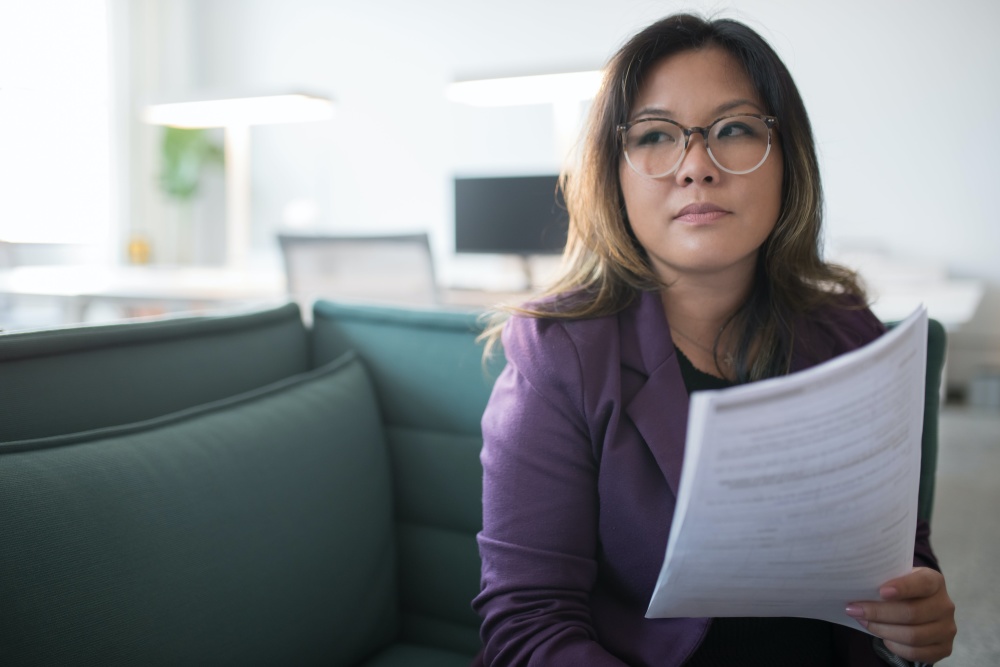Updated June 10, 2025
Meet The Women Founders of Japanese Companies
As Japanese society continues to evolve, there’s a greater emphasis on the simple, yet fundamental issue of equality.
Until recently, many aspects of life, including the business world, have shown a chronic lack of representation for women. That's why Japan (along with many other countries) is actively seeking solutions to remedy this complex issue.
So, are things looking up for women in Japan’s business scene today?
In this post, I’ll explain where Japan stands in terms of women founders and executives. How common is it for women to become executives at Japanese companies? I’ll look into this question and introduce some prominent women founders in Japan, plus some notable high-level executives.
First, let's start with a rundown of the current situation in Japan.
Japan’s Goal To Increase Company Female Executive Ratios
In order to tackle the issue of inequality in Japan’s corporate world, the government announced an ambitious target in 2023. The goal is simple: by 2030, women must be occupying at least 30% of executive positions in the nation’s leading companies.
This initiative, part of Prime Minister Kishida’s efforts to promote gender equality, specifically targets firms on the Tokyo Stock Exchange’s Prime market. The plan, which will be officially endorsed by Kishida’s cabinet, seeks to diversify Japanese boardrooms, which were traditionally imbalanced in terms of gender.
The initiative is driven by the current gender disparity in corporate leadership, with nearly 20% of Prime market companies having no female executives and only 2.2% achieving the 30% target.
The government’s approach encourages companies to nominate at least one female executive by 2025 and develop action plans to meet these diversity goals, with the Tokyo Stock Exchange expected to integrate these targets into its listing criteria.
Expanding its focus on entrepreneurship, the government also aims for women to lead 20% of startups in the J-Startup program by 2033. This comprehensive strategy and the goals set by the government underscore Japan’s commitment to fostering a more inclusive business environment.
Companies With Female Founders From Japan
As you can see, with the government’s efforts and the overall female empowerment movement that’s happening across the globe, Japan’s business landscape for women is changing rapidly.
One of the main factors contributing to the increase in female executives and founders in Japan is the presence of trailblazers who have already established themselves in the business world.
Below, I’ll introduce some remarkable women who are the founders of great, cutting-edge companies in the tech world, so let’s have a look.
Spider Labs
Founded in 2011, Spider Labs Inc. is a Tokyo-based cybersecurity firm specializing in digital advertising fraud prevention. The company aims to create a safer digital advertising environment by utilizing the power of automation.
Satoko Ohtsuki is the CEO and co-founder of Spider Labs. Under her leadership, the company developed Spider AF, a tool that detects and prevents advertising fraud, effectively safeguarding companies' marketing investments.
Ohtsuki’s experience balancing startup growth and motherhood inspires aspiring female entrepreneurs all over Japan. Her leadership promotes a diverse and inclusive workplace, with benefits such as childcare support, parental leave, and flexible work arrangements contributing to a dynamic company culture.
Ohtsuki's visionary approach has helped Spider Labs secure over 550 million yen in funding in 2021 and initiate global expansion. Today, with established offices in Tokyo, Lisbon, and New York, the company continues its growth trajectory, driven by Ohtsuki's commitment to technological innovation and workplace inclusivity.
Infostellar
Founded in 2016 by Naomi Kuraha, Infostellar is a company that offers flexible and scalable ground station services for satellites via a cloud platform. The company’s products can best be described as “AirBnB for satellites.”
Infostellar utilizes the existing space infrastructure and opens it up to worldwide collaboration. Typically, new ground stations are constructed for each satellite launched, but these stations can only communicate with the satellite for less than an hour each day due to the satellite’s orbit around Earth.
The founder Naomi’s brilliant approach involves renting out these existing ground stations across the globe, enhancing satellite coverage while also generating additional revenue for ground stations that would otherwise remain underutilized.
The ingenuity of Infostellar isn’t a coincidence, as prior to founding Infostellar, Naomi already had a Ph.D. in Electrical Engineering from the Kyushu Institute of Technology. You can follow her on X to learn more.
Code Chrysalis
Code Chrysalis, founded by Yan Fan and Kani Munidasa in 2017, has emerged as a leading force in Japan’s STEM landscape. It offers transformative coding boot camps and empowers women in the country’s tech scene.
Co-founder Yan, who transitioned from finance to tech, learned coding through a boot camp and later worked as a software engineer in Silicon Valley.
Yan’s journey also took her to the Middle East, where she commendably taught coding to Syrian refugees and women who needed monetizable skills during the Syrian civil war.
Motivated by Yan’s own experiences, Code Chrysalis is currently dedicated to advancing women’s leadership in tech through scholarships and internships, focusing on women and LGBTQI+ individuals, to bridge the gender gap in the field. You can follow Yan Fan on X and LinkedIn.
Wantedly
Wantedly was founded by the entrepreneur Akiko Naka in 2012 who’s still acting as the CEO of the company.
Built with a mission to pioneer “social recruiting”, the company has a matching platform to provide a better job-seeking experience to everyone. The platform facilitates candidates in requesting and scheduling meetings with companies, allowing smoother communication and a pain-free interview process.
Because the platform is quite popular among job seekers, the company is one the most well-known success stories in Japan, and it’s all thanks to the founder Akiko Naka.
Before founding Wantedly, Akiko worked in marketing and product development in the role of “growth coordinator” at Facebook Japan, but that’s not the only big name the founder is associated with. Akiko also worked at Goldman Sachs in the equity sales department.
In addition to her STEM-related endeavors, Akiko is also a manga artist. In fact, she even founded a global platform that allows users to share mangas, which is called Magajin. You can follow her on X and LinkedIn to get the latest updates from the founder.
DeNA
DeNA is the brainchild of Tomoko Namba — a true legend in the history of Japan's tech scene. The company, founded in 1999, operates in the digital entertainment world, and today, it’s one of the biggest mobile game and social network companies in Japan.
And even though Namba-san stepped down from her role as CEO in 2011 to tend to her private life, the foundation she built the company upon has ensured its continued success to this day.
Tomoko’s success in business isn’t a coincidence, as she also has an MBA degree from the world-renowned Harvard University. In fact, Tomoko even became the third woman to ever make partner at McKinsey & Co. To get the latest updates and learn more, follow Tomoko on X and LinkedIn.
MyMizu
The water-focused company MyMizu was co-founded by Mariko McTier and Robin Takashi Lewis, who is also a co-founder and director of Social Innovation Japan (SIJ). The founder is known for advocating for global sustainability and has built a company that stemmed from this motivation.
Essentially, MyMizu was founded in 2018 to reduce plastic waste and promote an overall sustainable lifestyle. The company’s program allows users to refill the water bottles they purchased from stores like Loft at various designated locations for free.
These refill points include not just public fountains but also various restaurants, shops, and cafes as well, which helps support local businesses in the process.
But MyMizu is not the founder’s only success story. Mariko has also been recognized in Forbes Japan as one of the “100 Self-Made Women” in the country, highlighting her significant contributions to social change and environmental sustainability.
What’s more, in addition to acting as the founding CEO of the company, Mariko also holds a council position in the World Economic Forum’s Global Future Council on Japan.
To learn more about the founder, you can follow Mariko McTier on X and LinkedIn.

Cinnamon AI
Founded by entrepreneur Miku Hirano, Cinnamon AI is not your average AI company. The AI technology utilized by the company is backed by notable names like Sony, and it aims to expand human capabilities through smart automatization.
Although the company is a big success, this isn’t Miku’s first rodeo. The founder has successfully established another company called Naked Technology, which she sold to Mixi in 2011.
In addition, the founder's success was also recognized by the newspaper Nikkei, as she was featured in the newspaper’s “The 40 Young Leaders Who Will Change The World” list.
Today, the founder serves as the founding CEO of Cinannmon AI. To find out more about Miku Hirano and get the latest updates, you can follow her on X and LinkedIn.
READYFOR
Established in 2014, READYFOR is one of the largest crowdfunding websites in Japan. The platform allows people’s ideas to come true no matter what their financial status is.
READYFOR is the result of a journey the founder Haruka Mera took into the business world back in 2010. After taking an entrepreneurship course with an emphasis on technology at Stanford University, Haruka was inspired to venture deeper into the tech world.
Later when she was a student at Keio Graduate School of Media Design (KMD), she founded READYFOR, which was inspired by her work on a “person search engine.”
The founder has also had the honor of becoming the first Japanese member to attend the World Economy Forum, through one of its initiatives called Global Shapers.
You can learn more about Haruka Mera and her current projects by following her on LinkedIn.
Anytimes
Anytimes is a peer-to-peer sharing economy startup founded by Chika Tsunoda. The platform allows individuals to match with other people who are open to doing small, daily tasks for other people at a price. Anytimes allows both parties to match and chat through the platform and even lets users manage payments securely.
The success of Chika Tsunoda’s company is the result of a career that encompasses multiple fields and disciplines, as she’s also a law graduate from Keio University. After graduating in 2008, she went on to work with companies like CyberAgent and Nomura Securities in various positions involving sales and PR, and finally launched Anytimes in 2013.
While still serving as the founding CEO of Anytimes, Chika Tsunoda is also the director of an online service for beauty professionals called QNoir. To learn more about her, you can follow Chika’s X and LinkedIn.
KIDSLINE
KIDSLINE, a pioneering online babysitting service from Japan, was founded by the dynamic and visionary entrepreneur Kahoko Tsunezawa. Kahoko’s entrepreneurial journey began after her tenure at notable companies like Recruit Holdings and Rakuten.
Proving she had a remarkable business acumen from the get-go, she founded her first startup, Trenders, from her home at the age of 26. Her entrepreneurial spirit soon led her to an impressive milestone in 2012, becoming the youngest female entrepreneur to be listed on the Tokyo Stock Exchange Mothers Index.
In 2014, Kahoko embarked on a new venture, establishing KIDSLINE, a startup designed to transform the landscape of childcare in Japan. Basically, KIDSLINE is an online platform that efficiently matches parents with babysitters, addressing the urgent need for reliable and accessible childcare.
The service is as convenient as it is affordable, with hiring rates starting from 1,000 yen hourly. Kahoko’s vision extends beyond providing a service as she aims to allow women to shine by normalizing and popularizing the use of babysitting services.
You can follow Kahoko on X to get the latest updates from her.
zaim
Takako Kansai, with her background as a journalist and editor at Nikkei Business Publishing, ventured into the tech world in 2001, with a focus on web-based businesses.
After teaching herself the necessary development skills to bring her ideas to life, she went on to create a personal family bookkeeping app in 2011, which, thanks to her entrepreneurial spirit and tech prowess, led to the birth of zaim in 2012. Under her leadership, the company grew rapidly, becoming one of Japan’s most popular services in its field.
Remarkably, the app must’ve hit the spot, as it also had the honor of being the number one app in its field on all three popular mobile application stores, Google Play, Apple App Store, and Microsoft’s Windows Store.
This achievement is all the more impressive when you consider that one of the major factors in the service's popularity was not through elaborate marketing but through user testimonies spreading organically among social circles.
Kansai’s expertise also extends to her role in a Ministry of Economy, Trade, and Industry workshop, focusing on information utilization in logistics and distribution.
You can follow the founder’s X and LinkedIn pages to learn more about Takako Kansai.
Receptionist
Leveraging her decade-long experience as a corporate receptionist, Mariko Hashimoto founded Receptionist in 2016.
Realizing the stagnation in reception processes amidst a rapidly digitizing world, Mariko founded the company to revolutionize outdated methods, such as keeping records by handwriting and relying on intermediaries.
Mariko’s vision for Receptionist is to streamline reception tasks while maintaining Japan’s highly esteemed hospitality culture. She states that her journey began with the single goal of creating a more efficient, yet culturally respectful reception experience in modern business.
To learn more about Mariko Hashimoto and get the latest updates from her, you can follow the founder on X.
KonMari Media
To the unknowing eye, Marie Kondo may have become an overnight sensation thanks to her Netflix show The Life-Changing Magic of Tidying Up. However, Marie is also a writer and entrepreneur. In fact, her hit show stemmed from a book of the same name.
Marie’s method of tidying up, which is called the KonMari method, also gives her company its name. The method promotes decluttering and getting rid of things that don’t “spark joy”, which became a catchphrase of global renown that even precedes Marie’s reputation today.
Marie’s passion for tidying up has been long-running; she started a consulting company for organizing homes and office spaces at the young age of 19. While she’s no longer the CEO of KonMari Media, Marie has made several TV shows after her Netflix success and has cemented her name as an international icon.
Marie Kondo also had the honor to be among TIME Magazine’s 100 Most Influential People in 2015.
To follow her future endeavors and learn more about her, make sure to follow Marie Kondo on X and LinkedIn.

TimeLeap
From early on, Nirei Ayaka sought to reform Japan’s education system. Despite beginning her education at Shonan International School for kindergarten and later moving to a public school, Nirei never felt truly connected to the Japanese education system at the time.
This disillusionment is essentially the foundation of the education startup TimeLeap.
While in her second year of junior high, Nirei founded GLOPATH with backing from her aikido instructor, stepping into the role of president. Her commitment to education led her to consult her former headmaster, and later acquire her alma mater, Shonan International School, in 2014.
In 2016, while attending Keio University, Nirei established TimeLeap, working as the CEO of the company. Under her leadership, the company focuses on developing educational businesses and offering consultancy services.
The founder’s efforts in education have earned her a spot in Forbes 30 Under 30 Japan, marking her as a prominent figure in Japan’s business world.
Follow Nirei Ayaka on X and LinkedIn to learn more about the founder.
Top Japanese Companies With Female Executives
As you can tell by now, the influence of women on Japan’s business scene, especially in the tech world, is undeniable. And even more brilliant women can be found working as executives, even if they didn't start their own companies.
Now, let's examine the impact and perspective of women who work as executives in Japanese companies and how they shape the future of these organizations.
Mercari (and Merpay)
Mercari is one of Japan’s biggest success stories; the company owns the largest second-hand marketplace in Japan. Through the platform, users are able to sell and buy used items, and make payments safely.
On the payment side of things, Mercari has its subsidiary, Merpay, a pioneering digital payment system that aims to decrease the use of cash in daily life.
I think it's safe to say that both Mercari and Merpay are stronger today because of the influence of women in prominent executive positions.
Most notably, Sayaka Eda who holds many titles, such as Director, Executive Officer, Senior Vice President of Corporate, and Chief Financial Officer at Mercari.
Another notable female influence under Mercari’s group umbrella is Mayumi Narisawa, the CPO of Merpay.
Both Mercari and Merpay are currently hiring foreign IT professionals as they have open positions posted on Japan Dev.
MoneyTree
A FinTech startup founded in 2012, MoneyTree is a Tokyo-based startup. The company’s most notable product is MoneyTree Link, a platform that allows users to connect the different financial services they use, allowing for seamless transactions. In addition, MoneyTree also has a personal finance management app.
Makiko Miyauchi is an experienced finance manager with 20+ years of experience under her belt, and she serves as MoneyTree’s Chief Financial Officer (CFO).
MoneyTree is also currently hiring foreign IT professionals, with open positions for backend and mobile engineers at the time this article was written.
MoneyForward
Another FinTech startup on our list, MoneyForward was established in 2012 and is based in Tokyo. The company offers a wide range of services in finance management at both personal and corporate levels, as well as SaaS products for businesses.
MoneyForward is another company with notable female influence, as the External Director CEO of the company is Etsuko Okajima, who graduated from Harward Business School. Additionally, the company’s Chief Human Officer (CHO) is Chiaki Ishihara, who’s also the Head of the Diversity, Equity, and Inclusion department at MoneyForward.
With several job openings on Japan Dev, MoneyFoward is currently hiring foreign IT professionals such as engineers and designers.
Axelspace
Established in 2008, Axelspace is a startup operating in the microsatellite industry. The company makes products that allow companies outside the space industry to utilize microsatellite technologies. Axelspace is also known for utilizing the first mass satellite production system in the country.
The space-tech company’s diverse management also includes female leaders, the most notable of whom is Makiko Hamada, the Executive Officer and Chief Human Resources Officer of Axelspace, who is also an alumnus of Keio University.
The company has open positions posted on Japan Dev and is currently hiring foreign engineers and designers.
Cybozu
One of the oldest names here, Cybozu is a Tokyo-based company established in 1997. They develop products that inspire teamwork and collaboration.
The company’s most notable products Mailwise, Cybozu Office, and Kintone tackle each aspect of office management in a unique way, providing competent office solutions to over 115,000 companies and organizations globally.
The company is also notable due to its female executives who help the company thrive. Among the most significant of the company’s women workforce are Yumika Nakane, who serves as the Executive Officer of the company’s Human Resources Division, and Noriko Sekina, the Executive Officer of the Customer Service Division.
Cybozu is also among companies that are actively seeking new talent, and tech professionals can find great opportunities posted on Japan Dev.

GLOBIS
GLOBIS is a company that focuses on business education. Established in 1992, the company owns the largest business school in Japan, GLOBIS University. In addition, GLOBIS also provides an in-house company training service with GLOBIS Corporate Education.
GLOBIS just might be one of the most women-driven companies out there, as the company has a large number of female executives. Particularly, Reika Cho, who is serving as the president of GLOBIS China Co. Ltd., and Tomoko Katsurayama, who is the President and CEO of multiple branches of GLOBIS in Asia, are great assets for the company’s continuous success today.
GLOBIS is also currently hiring foreign IT professionals like engineers and designers and has open positions posted on Japan Dev.
Kraken Technologies
A subsidiary of the Octopus Energy Group based in London, United Kingdom, Kraken Technologies was established as an energy tech (EnTech) company in 2015. The company focuses on spreading the use of clean technology, with a mission to prove that switching to green energy resources can be feasible and cost-effective for businesses.
Kraken Technologies CMPO (Chief Product and Marketing Officer) is Rebecca Dibb Simkin, who has ample experience in various executive positions prior, such as Head of Product and Brand Manager at notable UK-based companies.
The company is also among companies actively hiring foreign IT professionals, with multiple job openings currently available on Japan Dev.
Fujitsu Launchpad
A young, Tokyo-based company established in 2022, Fujitsu Launchpad is a venture studio that aims to help bring ideas to life. The company assists in creating businesses from the ground up, effortlessly turning brilliant ideas into stable and profitable businesses.
Fujitsu Launchpad is also a subsidiary of Fujitsu Limited, the well-renowned Japanese multinational electronics and information technologies giant.
The company is also among those with notable influence from women, as the head of product of Fujitsu Launchpad is Janna Fuller, who’s a graduate of the Royal College of Arts and Imperial College London.
With multiple job openings currently available on Japan Dev, Fujitsu Launchpad is looking for IT talent right now.
KOMOJU
KOMOJU has been providing payment services in specific industries since 2015. Most notably, the company works closely with digital entertainment and provides the payment gateways of the popular game platform Steam and the short-form video app TikTok.
KOMOJU also values the representation of women in management and is among companies with women executives. For instance, the company’s Chief Client Officer is Chiho Hemmi, who’s been an important asset to the company for the past 12 years.
With multiple job openings currently up on the Japan Dev job board, KOMOJU is looking for talented engineers and other IT professionals.
Accredify
Based in Singapore, Accredify is all about verifiable data. Since its establishment in 2019, the company has gained popularity in Asia-Pacific countries due to its brilliant blockchain-based technology that allows digital documents to be verified. Accredify’s service allows tamper-proof documents you can trust, as everything is cloud-based and recorded on the blockchain.
The company also has significant female representation at the management level, as the Chief Operating Officer Jing Yi Tan and Chief Marketing Officer Jessica Tan Shu En have both been indispensable members of the company since its early days.
Accredify is currently hiring software engineers, and job listings for IT professionals are frequently posted on Japan Dev.
Slalom
Established in Seattle, Washington, Slalom is a consulting firm that focuses on all aspects of business strategy and transformation. Since its founding in 2001, the company's services have become popular in multiple industries, in over 30 countries across the globe.
Slalom is another company with ample representation of women in its management. Most significantly, the Chief Marketing Officer of the company is Sangeeta Prasad, who has an outstanding resume decorated with past experiences at notable corporations such as JPMorgan Chase and Procter & Gamble before working at Slalom.
Need I add, the company is also a great place to work overall, as it had the honor of being recognized by Fortune Magazine’s 100 Best Companies to Work For list for the past five years consecutively.
Conclusion
As I shine a spotlight on these trailblazing women and companies led by visionary women, one thing becomes clear: the landscape of corporate Japan is on the brink of an era of transformation.
The founders and executives I introduced above aren’t just breaking barriers. They’re also setting new benchmarks for leadership and innovation in business. Their achievements underscore the untapped potential of female leadership and the impact it can make.
As Japan continues to embrace and promote gender equality, it’s safe to say that the future of women in Japan looks more promising than ever.
The road to true equality is one that’s long and challenging, but each success story like the ones I told here makes the future a bit clearer for all the others, adding to a momentum towards change that’ll hopefully become unstoppable.
While this is it for women executives in Japan, if you want to learn more about the influence of women on Japan’s business landscape, you can check out my post on women in Japan's tech world.
Get Job Alerts
Sign up for our newsletter to get hand-picked tech jobs in Japan – straight to your inbox.







